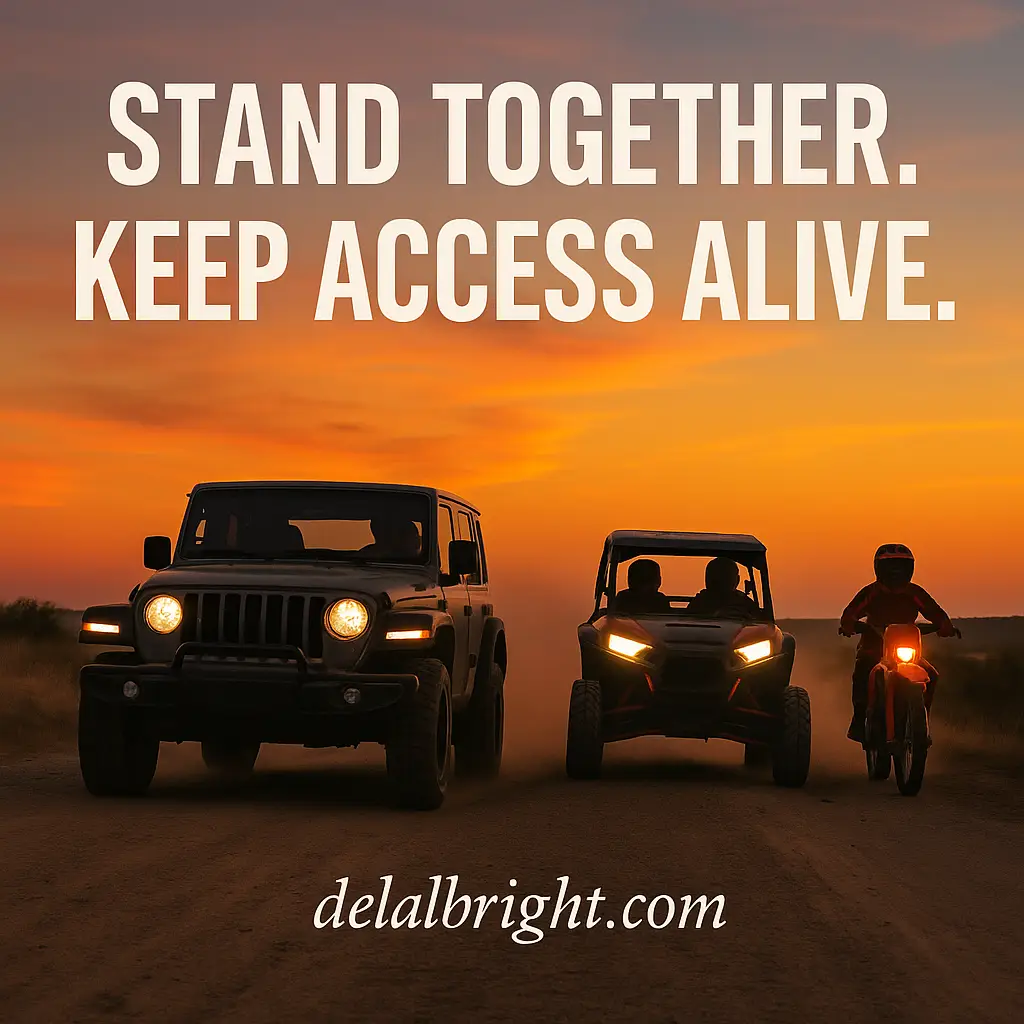Why Unity (and Multiple-use) in Outdoor Recreation Matters More Than Ever
By Del Albright
For decades, multiple-use has been talked about, marketed, and displayed on public land signs. Yet, a well-funded vocal minority has steered public-land decisions in ways that restrict access, limit recreation, and divide user groups. Meanwhile, the vast majority — those of us who camp, wheel, hike, hunt, ride, mine, ranch, paddle, explore, and make a living from public lands — have been left reacting instead of leading.
I say it’s time for that to change.
It’s time for multiple-use to take the lead — not just as a land-management term, but as a movement. It’s time for all of us who depend on and enjoy public lands to pull together, speak up, and take back our role in how those lands are managed.
️ The Power of a United Outdoor Community
Imagine the numbers if we stood shoulder-to-shoulder:
- Everyone who wheels a 4×4, SxS, ATV, or overlander
- Every RVer towing an SUV
- Every snowmobiler, mountain biker, equestrian, hunter, angler, and hiker
- Every small business and manufacturer who thrives on outdoor recreation
- Everyone who buys aftermarket parts, fuel, trailers, camping gear, or public-lands permits
- Every American who simply wants access to their own land
That isn’t a fringe group. That’s the majority of Americans.
If we approached public-land issues together — instead of splintered into tiny user groups — we could literally “rule the world” of policy, narrative, and representation.
Step One: Share the Land. Share the Mission.
Unity doesn’t start in Washington — it starts on the trail.
If we want policymakers to treat us as a unified coalition, then we must first act like one. That means learning to share trails, trailheads, parking lots, staging areas, and campsites — and to understand the needs of others even when they don’t match our own. I call it reasonable tolerance (because we don’t always like everything other users do).
“Seek first to understand; then be understood.”
Shared knowledge = shared solutions.
Shared solutions = shared access.
️ Where We’re Falling Short
Public-land managers are often handed an impossible job: balance dozens of competing uses with shrinking budgets, lawsuits, political pressure, media spin, and conflicting interests. When we’re not present, engaged, and participating, we leave them guessing — or worse, we leave the door open for anti-access groups to fill the void.
We can complain that land managers “don’t get it,” or we can show up and help them get it right.
That means:
- Showing up to meetings, comment periods, and planning sessions
- Helping design trail systems that work for multiple types of users
- Speaking as a unified outdoor community, not a dozen splintered ones
- Educating elected officials before rules are written
We don’t get more access by yelling.
We get it by working the process and outnumbering the opposition.
Why This Matters Now
Public land is a limited resource. The population keeps growing. Outdoor recreation is exploding. And every time users fight each other instead of working together, someone else writes the rules for us — usually not in our favor.
Some groups want to fix this by locking more land behind Wilderness-only designations, shutting out everything except hiking and backpacking.
The better solution?
- Shared trails
- Cooperative land planning
- Public involvement
- Reasonable compromise
- “Multiple-use” done right
Time to Get in the Game
We own public land. It’s ours — not the government’s, not a minority’s, not a lobbyist’s. Ours.
If we want to keep access, opportunity, and freedom alive, then:
- Join a club or organization that fights for access
- Support groups that support you
- Show up — online, in person, and on comment sheets
- Be part of the solution, not just a frustrated bystander
- Share the land and the mission
With involvement, unity, reasonable tolerance, and cooperation, yes — we absolutely can rule the world.
And we should.

